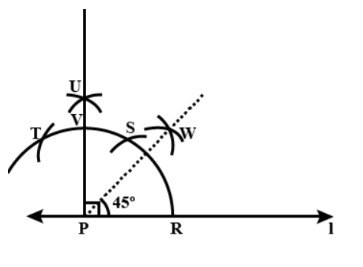Answer
358.2k+ views
Hint: Take a point P on a line l. Use the orthodox method to construct a right angle. To construct the bisector of this right angle, draw an arc with centre at R and another arc with centre at V with same radius intersecting each other. Join the intersection point and P. This is the bisector of the right angle.
Complete step-by-step answer:
In this question, we need to draw a right angle and then construct its bisector.
First, let us understand what an angle bisector is.
Angle bisector is a line that splits an angle into two equal angles.
Now, follow the given steps to draw a right angle and then construct its bisector:
(1) Draw a line l and mark a point P on it. Draw an arc of convenient radius, while taking point P as centre. Let it intersect line I at R.
(2) Taking R as centre and with the same radius as before, draw an arc intersecting the previously drawn arc at S.
(3) Taking S as centre and with the same radius as before, draw an arc intersecting the arc at T.
(4) Taking S and T as centres, draw arcs of same radius to intersect each other at U.
(5) Join PU. PU is the required ray making a right angle with line l. Let it intersect the major arc at point V.
(6) Now, taking R and V as centres, draw arcs with radius more than half of RV to intersect each other at W. Join PW.
PW is the required bisector of this right angle.
Following is the final diagram after construction:
Note: In this question, note that in step 2, it is very important to keep the radius the same as used in step 1 to draw the major arc else you will get a wrong answer. Also, note that in step 6, it is very important to keep the radius more than half of RV.
Complete step-by-step answer:
In this question, we need to draw a right angle and then construct its bisector.
First, let us understand what an angle bisector is.
Angle bisector is a line that splits an angle into two equal angles.
Now, follow the given steps to draw a right angle and then construct its bisector:
(1) Draw a line l and mark a point P on it. Draw an arc of convenient radius, while taking point P as centre. Let it intersect line I at R.
(2) Taking R as centre and with the same radius as before, draw an arc intersecting the previously drawn arc at S.
(3) Taking S as centre and with the same radius as before, draw an arc intersecting the arc at T.
(4) Taking S and T as centres, draw arcs of same radius to intersect each other at U.
(5) Join PU. PU is the required ray making a right angle with line l. Let it intersect the major arc at point V.
(6) Now, taking R and V as centres, draw arcs with radius more than half of RV to intersect each other at W. Join PW.
PW is the required bisector of this right angle.
Following is the final diagram after construction:

Note: In this question, note that in step 2, it is very important to keep the radius the same as used in step 1 to draw the major arc else you will get a wrong answer. Also, note that in step 6, it is very important to keep the radius more than half of RV.
Recently Updated Pages
How many sigma and pi bonds are present in HCequiv class 11 chemistry CBSE

Why Are Noble Gases NonReactive class 11 chemistry CBSE

Let X and Y be the sets of all positive divisors of class 11 maths CBSE

Let x and y be 2 real numbers which satisfy the equations class 11 maths CBSE

Let x 4log 2sqrt 9k 1 + 7 and y dfrac132log 2sqrt5 class 11 maths CBSE

Let x22ax+b20 and x22bx+a20 be two equations Then the class 11 maths CBSE

Trending doubts
Establish a relation between electric current and drift class 12 physics CBSE

Guru Purnima speech in English in 100 words class 7 english CBSE

Fill the blanks with the suitable prepositions 1 The class 9 english CBSE

Difference Between Plant Cell and Animal Cell

Difference between Prokaryotic cell and Eukaryotic class 11 biology CBSE

Write a letter to the principal requesting him to grant class 10 english CBSE

Copper is not used as potentiometer wire because class 12 physics CBSE

Give 10 examples for herbs , shrubs , climbers , creepers

Fill in the blanks A 1 lakh ten thousand B 1 million class 9 maths CBSE






